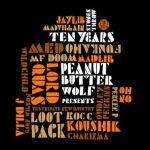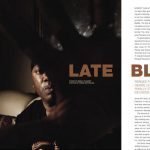PB Wolf: Not your average predator Hip-hop legend Peanut Butter Wolf headlines this weekend’s DMC Finals.
Do not mince words with a wolf – especially not with the leader of the pack. The quickest way to find yourself between his teeth is an awkward silence after a not quite well formulated question. Sometimes, however, that kind of awkward silence is hard to avoid. At times, respect simply breeds nervousness, and nervousness breeds rambling, and so on and so forth.
You can’t blame me, though. Since the late ’80s the West Coast’s Peanut Butter Wolf has lived a life of a hip-hop legend that’s been created out of tragedy, triumph and bangin’ music. It’s a career that you couldn’t make up if you tried. From his early production days with Lyrical Prophecy, to the recent 10-year anniversary of his Stones Throw Records label, Wolf has kept his ear to the ground and his feet firmly planted in the foundation and fundamental medium of hip-hop music – the records.
It’s fitting, then, that with the 2006 DMC Canada DJ Championship Finals being held for the first time in Ottawa, a record junkie like Wolf would headline Saturday’s DJ competition – one where vinyl is still the mainstay despite the growing popularity of CD turntables.
They say that when face-to-face (or receiver-to-receiver) with a ferocious animal like a bear or a wolf, you should stand your ground and above all not show how scared you are. That might work for the average predator, but not a legend like Wolf. Wolf isn’t just another over-hyped superstar DJ. It can be fairly argued that Wolf – his music, his label and his vision – has been instrumental in helping to shape today’s hip-hop.
GOING BACK TO CALI
California is rich in hip-hop tradition and has been since that music’s inception in the early ’70s. For a cultural movement whose nascence can be traced to an inner-city block on the opposite end of the country, rap quickly spread to the West Coast. The second migration of blacks from the East and Midwest to the West Coast throughout the ’70s and ’80s might have helped rap’s growth, or it might have merely been a synchronous coming of age, or maybe hip-hop was really just that big. Regardless, the culture was bubbling to such a degree that as early as 1984, Dr. Dre and the World Class Wrecking Cru were signed to a label (Thump Records) and releasing hip-hop albums down in Cali, only five years after the release of Rapper’s Delight. That same year, Peanut Butter Wolf began releasing his first series of records, which was part of a joint with a guy called Lyrical Prophecy on PMR Records. Soon after he found the C.L. Smooth to his Pete Rock in a young emcee called Charizma. The two put in the work and were signed to Hollywood Basic. Even this early in hip-hop’s history, however, industry rule #4,080 would prove to be the law: Their album would be shelved, and before it could be released Charizma would die tragically in 1993.
After releasing Charizma’s Just Like a Test single in ’94 on David Paul’s Bomb Hip-Hop compilation, Wolf produced the work that would springboard him into the second phase of his career. After creating Peanut Butter Breaks, an instrumental LP for Upstairs Records, his star began to rise. After joining an impossibly talented roster composed of the world’s legendary DJs – Mix Master Mike, Q-Bert, Cut Chemist, Z-Trip, Shortkut and more – Wolf’s star wasn’t just rising, it was now squarely in the heavens with another release, the Return of the DJ: Vol. 1 compilation, a release that had its roots in the idea of reprioritizing the DJ in hip-hop. But Charizma’s death still lingered over Wolf, and yearning to share the music he and Charizma had once made, Wolf began toying with the idea of starting his own label to do just that. In ’96 his label’s first release was a Charizma single: My World Premiere.
From then on, Wolf has been doing what DJs do best: turning people on to good music. Since establishing Stones Throw Records, Wolf has used his digger’s eye and his DJ’s ear to cultivate a record label of the highest quality. Dedicated to putting out music that he himself would want to hear, the label’s releases are as varied as Wolf’s famed record collection.
From the “backpack rap” of the Lootpack to the futurist-via-revisionist Shades of Blue album by Madlib, from the street-level tales of Roc C to the sublime musical world of Aloe Blacc, his label is a combination of interests and instincts. What follows are cuts from a recent conversation XPress had with Wolf about everything from copyright law to Public Enemy, Madlib and turntable technology. For your sake, the geek-outs, fearful ramblings and awkward silences have been omitted.
THE MIND OF A WOLF
Xpress: You’re one of the headliners for the DMC Finals. I was wondering how you felt about the advances in technology for DJs. In other words, how do you feel about bringing tech to the tables, so to speak?
Peanut Butter Wolf: I like trying to make my mixes kinda flow like they’re the same song, so I like using [DJ technology] to keep things in key.
X: Yeah, but as far as the battle goes?
W: I haven’t really been to a DJ battle in the past year, and throughout this past year Serato [popular turntable technology] got big so I’m interested to see how all of that’s gonna play out. A lot of DJs think that it’s wack if you use a computer, but I can see both points. I prefer vinyl, but with the computer you have so many songs at your fingertips. It kinda gives you more freedom. Plus travelling with vinyl is never fun. I usually have to check ’em [at the airport] ‘cuz I bring so many and it’s kinda scary. I’ve lost records before. I’ve also nearly put out my back carrying them all. I have to admit, it’s so much easier with a computer. But computers aren’t foolproof, especially in battle conditions. I’d be pretty surprised if you saw computers this time around [at this weekend’s DMC Finals]. If you flip it [CDs] and do something ill with it, that’s one thing, but if you’re just doing the same thing as you would with vinyl, then the vinyl will get the thumbs up.
X: I was recently listening to a Roc C track and he’s got a line where he says, “I’m gonna make Wolf rich.” It sounds like he’s suggesting you’re getting rich off of him. Is that true?
W: That’s just the confidence I used to see in Charizma. I think Roc C’s just showing the world that he has the ability to put me on. That’s what I saw in Roc C [when Wolf signed him to Stones Throw] and that’s why I like working with hungry artists like that.
X: On your label, when artists like Roc C create an album like he did, a lot of other labels might consider him too urban to sign. You didn’t. Why?
W: Well a lot of our “fans” think that [artists like that] are too urban as well, so I just kinda put out what I like. What I like is very personal. I really do wish a Quasimoto fan would see the relevance of a Roc C album. Some Quasimoto fans do, and some don’t. And you know the Quasimoto album that we put out never came out on a major label. We put it out on an indie label and did decent with it, but like you’re saying, there’s no way that it would have came out. Most indies [labels] wouldn’t even have taken the risk. I just kinda went balls out and said “fuck it,” you know? If I go bankrupt, I go bankrupt – at least I put a good album out. It’s something I’ve had to do a lot of times.
X: One of the most important things about hip-hop is its use of samples. Most people get bogged down in the argument of stealing and ownership regarding samples and copyright laws, but how often is sampling viewed as a way of archiving music?
W: That’s what’s frustrating, because [in other disciplines] if you see something and make something based on it, it’s cool, but if someone samples in hip-hop, they get sued. It’s kinda messed up. I mean, any band can do a cover of any song and it’s legal, but if I use a sample, it’s illegal – where’s the logic in that? I think we need to change the judicial system.
X: Agreed. That kind of thinking really damned creativity in a way, and has now created a climate in which it’s almost mpossible for a sample-heavy album like Public Enemy’s It Takes a Nation of Millions to ever be created again.
W: Definitely.
www.ottawaxpress.ca

